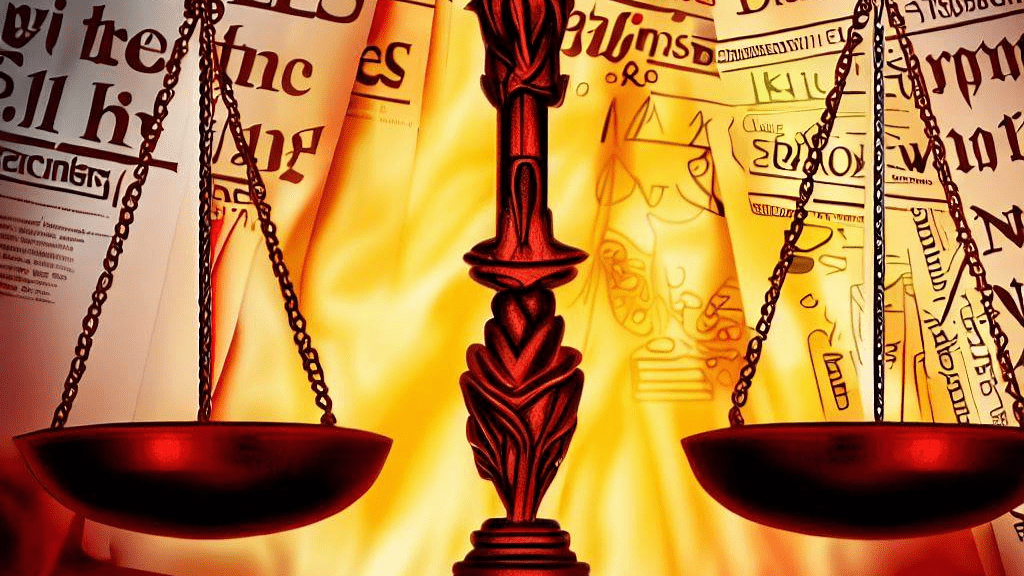
Former FTX co-founder, Sam Bankman-Fried, has found himself embroiled in a gripping legal saga centered around allegations of witness tampering. The controversy erupted when Bankman-Fried allegedly provided the New York Times with excerpts from the private journal of former Alameda Research CEO, Caroline Ellison. As the battle intensifies over First Amendment rights, the U.S. government contends that Bankman-Fried went beyond exercising free speech, demanding bail revocation.
Bankman-Fried’s Legal Team’s Defense
In response to the witness tampering accusations, Bankman-Fried’s legal team firmly asserted that their client was merely exercising his constitutional right to free speech. To bolster their claim, they submitted an expert affidavit from a distinguished Harvard Law School professor, who supported Bankman-Fried’s right to communicate with the media. The New York Times also came to his defense, emphasizing the significance of adhering to SDNY Local Criminal Rule 23.1’s provisions to safeguard the public’s First Amendment right to access information about financial misconduct.
The DOJ’s Counterarguments
However, the Department of Justice (DOJ) vehemently countered the New York Times’ correspondence, asserting that Bankman-Fried’s actions exceeded his First Amendment rights. The DOJ claimed that his disclosure of Ellison’s confidential writings to the newspaper was a deliberate attempt to manipulate public opinion about her and himself. The prosecution argued that Bankman-Fried’s actions aimed to discredit a trial witness and influence the jury pool, actions that exceeded his legitimate constitutional right to engage with the press.
Request for Bail Revocation
In the wake of the court’s reprimand, suspicions arose regarding Bankman-Fried’s potential involvement in federal felonies, such as witness tampering or attempted witness tampering. The prosecution demanded the revocation of Bankman-Fried’s bail, seeking his detention at the Metropolitan Detention Center (MDC) until the commencement of his trial.
Implications for First Amendment Rights
As the legal battle unfolds, conflicting opinions on First Amendment rights continue to fuel the debate. The prosecution maintains that Bankman-Fried’s actions were manipulative and crossed legal boundaries, while the media upholds the importance of protecting freedom of expression and the public’s right to information. The outcome of this case will likely have far-reaching implications for the boundaries of free speech and the responsibilities of those exercising this constitutional right.
The Significance of First Amendment Rights
The First Amendment of the United States Constitution protects the freedom of speech, press, assembly, and the right to petition the government. It is a fundamental tenet of democracy and ensures that individuals have the right to express their views, share information, and engage with the media without fear of government censorship or retaliation.
In cases involving high-profile individuals, such as Sam Bankman-Fried, the tension between exercising free speech and potential witness tampering raises important questions about the limits of First Amendment rights. While free speech is a cherished right, it is not absolute and may be subject to restrictions when it interferes with other legal obligations, such as preventing witness intimidation or tampering.
The Role of the Media in Upholding Free Speech
The media’s role in upholding free speech is crucial in a democratic society. Journalists and media outlets play a vital role in informing the public, uncovering truths, and holding powerful individuals and institutions accountable. It is essential that the media has the freedom to access information and disseminate it to the public, as long as it adheres to ethical standards and legal boundaries.
However, media responsibility also entails striking a balance between the right to free speech and the ethical use of information. Journalists must exercise caution and adhere to ethical guidelines when reporting on sensitive issues that may impact legal proceedings or witnesses involved in a case.
Conclusion
The legal saga surrounding Sam Bankman-Fried’s witness tampering allegations highlights the complexities of First Amendment rights and the responsibilities of individuals exercising this constitutional privilege. While the case unfolds, the outcome will likely shape the boundaries of free speech and set precedents for the responsibilities of those communicating with the media. As the legal system grapples with these issues, it is crucial to uphold the importance of free speech while ensuring the fair and just administration of justice.

Get the latest Crypto & Blockchain News in your inbox.